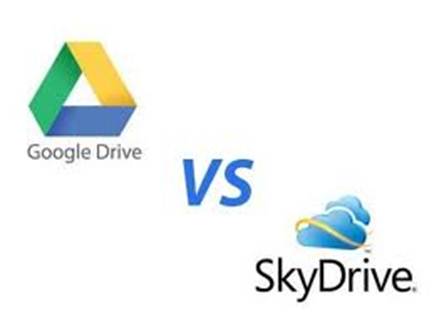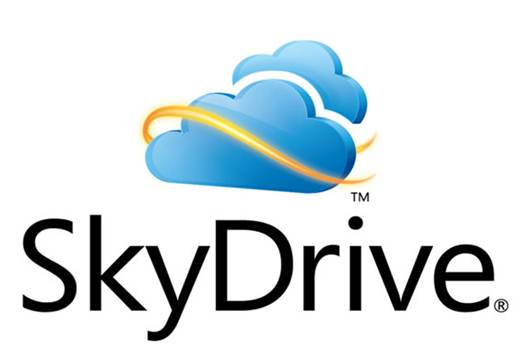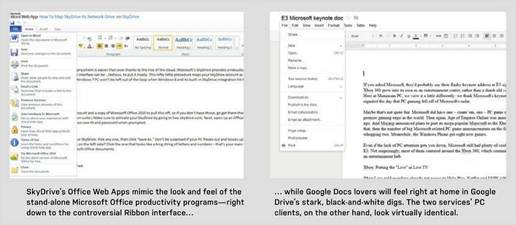After years of rumors and whispers, Google
finally released its long-awaited Google Drive cloud storage service in April,
combining Dropbox-like synching abilities and a PC client with the company's
Google Docs service. Microsoft could have waved the white flag; instead, it
released an excellent update for its own SkyDrive service, adding many of the
features found in Google Drive. The chips are on the table and there’s only one
question left: Which cloud storage service is better?

Round 1: Interface
Microsoft and Google must've done their
homework before launching GDrive and SkyDrive, because the PC and Mac clients
for the respective services look and feel an awful lot like Dropbox's.
Basically, each appears as just another folder on your computer, albeit a
folder that seamlessly syncs with the cloud whenever something inside of it
changes. The synched folders even appear in Windows Explorer's Favorites
sidebar just like Dropbox's client. It's painless and wonderful.
It's a toss-up on the web interfaces, too.
Both have simple, flexible, and functional Uls that deliver all the information
you need without being overly busy. Both also feature list-and thumbnail-style
viewing options. We prefer SkyDrive's colorful look to Google Drive's drab
hues, but that's just a matter of personal taste.
Winner: Draw
Round 2: Storage/Price

Skydrive
New SkyDrive sign-ups receive 7GB gratis
—compared to the free 5GB offered by Google Drive and veteran users can opt to
grandfather in their full 25GB of free space. Plus, SkyDrive's upgrade options
are cheaper than Google Drive's, and unlike Google, Microsoft offers a 50GB
plan.
Google Drive outshines SkyDrive in the
total amount of upgradable space available, however. SkyDrive tops out at
100GB, while Google Drive goes all the way up to a whopping 16 terabytes (for a
similarly whopping $800/month]. Also, Google Drive caps file uploads at 10GB,
compared to SkyDrive's 2GB max.
We think 100GB of cloud storage is more
than enough for most people, though. SkyDrive's cheaper prices and more
generous free storage earn it the win.
Winner: SkyDrive
Round 3: Platform Support
Part of the allure of synching-style cloud
storage solutions is the ability to access your files from virtually anywhere.
Both services have Windows and Mac desktop clients while neglecting Linux
lovers (who’ll have to stick to Dropbox). The real difference lies in mobile
support: SkyDrive offers dedicated iOS and Windows Phone apps, while Google
Drive only has an Android app. Neither has announced plans for Black-Berry
support.
As it stands, SkyDrive gets the nod for
supporting two mobile platforms, including the liber-popular iOS, and for its
deep-rooted Windows 8 integration. An Apple-compatible app—which Google says is
in development—will add a lot of appeal to Google Drive, though both services
pale compared to Dropbox and SugarSync’s widespread mobile support.
Winner: SkyDrive
Round 4: Collaboration

Both services offer basic in browser
editing for documents, spreadsheets, slide shows, and more, and users can
collaborate with others to tinker with files in real time. The superb feature
sets SkyDrive and Google Drive apart from their competitors.
Giving others permission to read or edit
files is a snap in both services, and each gives you the ability to email
direct links to specific files. SkyDrive goes the extra mile and includes a
Public folder that anybody can access, as well as support for sending links to
over 30 social networks (but not Google+).
Once you’re actually collaboratively editing
a document, though, Google Docs presents changes in real time, while SkyDrive’s
Office Web Apps forces all users to save and refresh documents before showing
others’ edits. Google’s approach is vastly superior.
Winner: Google Drive
Round 5: File Protection
What if, in the midst of a hot-and-heavy
collaborative editing session, a clueless co-worker accidentally deletes an
important chunk of text and saves the change? Fear not: Both Google Drive and
SkyDrive contain handy-dandy version history tools that can restore files to
previous iterations. SkyDrive tracks the last 25 versions of a file, while
Google Drive maintains file histories for 30 days or up to 100 revisions.
The big difference lies in what happens
when you accidentally delete a file completely. In SkyDrive, deleted files are
simply gone, never to be seen again. Google Drive, however, moves deleted files
into a Trash folder, where you can then choose to delete the file permanently
or restore it to its original location, complete with its version history
intact if it's a document.
Winner: Google Drive
And the Winner Is...
Sigh. Ties satisfy no one, but individual
needs really do determine which of these closely matched cloud-based services
is right for you. Google Drive, basically being Google Docs on steroids, holds
the slight edge in productivity tasks; SkyDrive is slightly cheaper, offers
slightly more free storage, and is available on more mobile platforms. Sign up
for the service that supports your mobile platform of choice, or heck, give me
each a whirl if you're on the fence. Yay fermium!